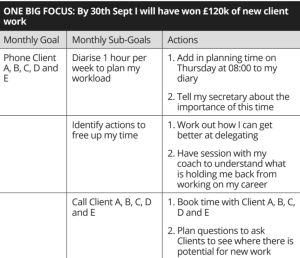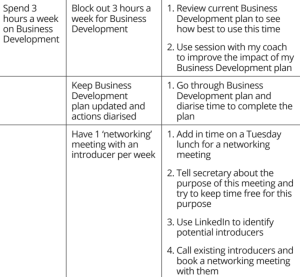Wouldn’t everything be much easier if your partners gave you clear guidance on what you actually need to do to make partner? Rather than the often conflicting and vague advice such as ‘just win more business.’ That’s really not helpful at all, is it? To help you overturn that reality when on the partner track, here is exactly what you need to do to make partner.
*This blog is an excerpt from chapter 3 of the 3rd edition of Poised for Partnership. This chapter focuses on your ‘Plan’ to help you drive your career forward no matter how busy you are. Download your free copy of Chapter 3 here.
What you need to do to make partner
Based on our experiences of working with hundreds of lawyers, accountants and consultants from the very largest firms through to strong, regional firms, we have found that there are 3 main steps you need to take to make partner. Read: How early should I start preparing for partnership?
 1. Assess yourself against the 12 key indicators
1. Assess yourself against the 12 key indicators
Your starting point for making partner should be to create your Partner Track Plan. Without a plan, you’re planning to fail, so start thinking about this sooner rather than later. To create a solid plan, you first need to assess yourself against the 12 key indicators. These are the 12 areas that you need to excel in if you are going to have any sort of chance of making it to partner:
- Mindset: Do you have the right mindset to transition from senior employee to partner, i.e. a business owner?
- Direction: Do you know what really makes you tick and what you stand for?
- Plan: Do you have a career plan guiding you to do the right things at the right time?
- Support Team: Do you have the right Support Team in place to help you go all the way?
- Delegation: Do you have the right people to delegate to so you can free yourself up to focus on partner-type responsibilities?
- Go-To Expert: Are you widely known and seen as an expert in what you do? Does work come directly to you?
- Referral Network: Have you built referral networks to supply you with enough of the right type of work?
- Business Development Habit: Do you routinely do a bit of business development each day?
- Personal Case: Do you match up against the criteria required for your partners in your firm?
- Member of the Club: Do your partners and clients already think of you as a partner? Do they trust you to deliver and want to have you as their business partner?
- Business Case: Are you implementing a robust business plan to help you grow the profits of your firm?
- Partnership Admissions Process: Have you prepared for each element of the process? Can you pitch your business case succinctly?
The easiest and quickest way to do this is to take our free Partnership Readiness Assessment to see how you match up against the 12 key indicators. From this assessment, you will be given a report which shows you how well you scored for each of the 12 key indicators.
 2. Focus your partner track plan using your ONE BIG FOCUS
2. Focus your partner track plan using your ONE BIG FOCUS
Once you have your results from your Partnership Readiness Assessment, you will know where your weaknesses are (I.e. the specific areas you need to focus on to make partner). It can be really tempting to work on all these areas at once OR to become overwhelmed with them and do nothing at all. Either way, both of these routes are a recipe for disaster! If you want to be successful and actually make progress towards partner, you will need to work on one key indicator at a time. For example, start by choosing the indicator that will drive your career forward the most. Once you’ve chosen your ONE BIG FOCUS, you can then break this down further to create your Partner Track Plan. You should be planning to achieve this over 90 days, so set yourself 3 smaller monthly goals to hit along the way. Example of using your ONE BIG FOCUS to create your plan:
Rough plan
My ONE BIG FOCUS for the next 90 days is to find £120k of new work. To do this I will:
- Delegate more so I have the time to:
- Phone all of my contacts and clients who have instructed me in the last 12 months.
- Allocate an hour each week to plan ahead so I can delegate more effectively and consistently to my team.
- Manage my clients’ expectations better so they get the information I need back in good time.
Final plan
 3. Make the time to execute your plan
3. Make the time to execute your plan
It’s all well and good making a plan, but it does nothing for you unless you use it. This is actually the hardest step in making partner as time is short for you as it is. Finding time to work on your career is always a challenge, but you absolutely have to make time if you want to make partner. You have to make time to work on yourself and here is how you do it:
- Just start – no matter how small or insignificant a task may feel, just getting started with executing your plan will trigger the reward system in your brain. That’s all the momentum you need to get the ball moving.
- Prioritise your development – treat yourself as a client. By doing this, you are essentially giving yourself permission to devote chunks of time to accomplish the necessary development work.
- Eliminate the “when” – don’t get caught up in the mindset of “I will start this when…I have a quiet period or when I’ve won a new piece of business” etc. Create your plan, diarise your actions, and get it done.
- Pace yourself – you’re running a marathon, not a sprint. Focus on one key indicator at a time and review your career progression every 3 months. You can then reset your focus.
- Create time to review your progress – it is crucial to set aside time to review what you have learnt and what you need to focus on. It is a good idea to put aside some time every month, potentially with your coach to do this.
- Learn how to say “no” – too much “yes” can easily lead to overwhelm or not having enough time to do the things that really matter. Learn How to say no gracefully without fear of making a career-limiting move.
- Delegate effectively – if you are going to expand the amount of time you have to build your practice, you will need to learn to delegate well to more junior staff.
- Network effectively – make sure your networking efforts are fit for purpose. Take the time to really consider why you are networking, the brand you want to build, and the people you need in your network.
- Polish your management skills – continual disruptions, poor quality work, and too much time spent reworking, are some of the most common complaints about junior staff. Most of these complaints don’t stem from poor quality junior staff; they stem from a lack of good team management. Learn how to manage better so that you can build a high-quality team beneath you.
- Use a default diary – this is where you have a standard daily, weekly, monthly, quarterly routine, which is timetabled permanently into your diary. This makes sure that the important (but often non-urgent) stuff, such as working on your Partner Track Pan, business development and meetings with your team members, happens.
If you need more help with time management, read our latest blog: How to find the time to progress through your Partner Track Plan
Take these 3 steps to start your journey to partner
When thinking about what you need to do to make partner, it’s all about focusing on one key indicator at a time and only moving on to the next one when you can confidently tick it off. No longer is the partnership track shrouded in mystery. All you have to do is take charge of your own development and start by assessing where you are on your journey now. Once you’ve done this, you can then create your Partner Track Plan and execute it to start moving closer to your end goal.
Don’t forget to download the full chapter of the 3rd edition of Poised for Partnership. This chapter will help you work out what motivates you, what makes you tick, and whether partnership is right for you and if it’s what you want. Download your free copy of Chapter 3 here.
Build your partner-ready skills
with Progress to Partner Academy
Keeping your head down and working hard won’t get you noticed!
Get online access to self-study courses, short and long videos packed full of advice.
My Progress to Partner academy members know exactly where they need to focus to get noticed as partner-material each day, week and month of their career. Isn’t it about time that you did?
The training & advice you won’t get from your firm is yours when you join my online Progress to Partner Academy.










